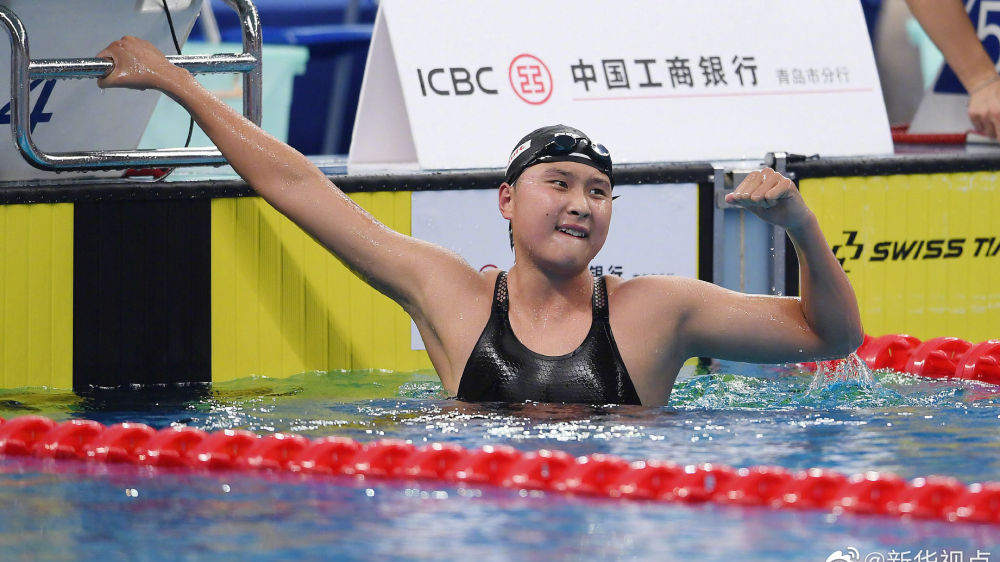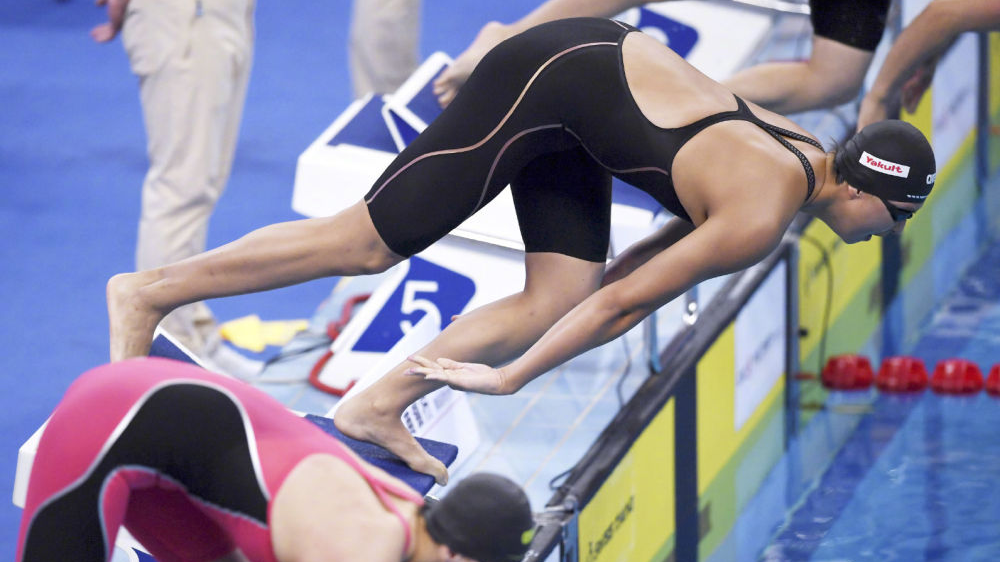China's 18-year-old swimming prodigy Wang Jianjiahe smashed a new Asian record in the women's 1,500-meter freestyle on day two of the 2020 Chinese National Swimming Championships in Qingdao on Monday.
Hitting the wall in a time of 15:45.59, Wang bettered the previous Asian record by 1.1 seconds, which she logged at the 2019 Pro Swim Series Des Moines stop last year. Her next closest competitor on Monday came in nearly 30 seconds later.
"I really didn't expect such a good result," said Wang. "I thought I could finish within 16 minutes, but this time was quite a surprise to me."
Wang was the bronze medalist in the women's 1,500-meter freestyle at the Gwangju 2019 FINA World Championships. However, according to the rising swimming prodigy, she has experienced a lot of ups and downs since the end of last year.
"I would like to thank my coach for his understanding and help. Otherwise, I wouldn't be able to come back," she said.

Wang Jianjiahe celebrates after hitting the wall in women's 1,500-meter freestyle at the 2020 Chinese National Swimming Championships in Qingdao, Shandong Province, September 27, 2020. /Xinhua
Wang Jianjiahe celebrates after hitting the wall in women's 1,500-meter freestyle at the 2020 Chinese National Swimming Championships in Qingdao, Shandong Province, September 27, 2020. /Xinhua
Despite her record-breaking win, Wang will not participate in the final because she was behind in the physical fitness section, which together with the performance in the pool, count toward qualifying for the final.
"I only scored 29 out of 50 in the physical fitness test because the 3,000-meter run is not my advantage," said Wang as she expressed her frustrations.
"We do stress the importance of physical fitness; however, it shouldn't be the defining factor. If the competition bases swimmers' qualifications into the final on physical fitness only, I think some part is missing here," said Wang.
This year's Chinese national swimming championships is the first national swimming competition in China to include physical test requirements.
It is following the guideline laid out in February by the General Administration of Sports of China to emphasize the importance of physical training to better prepare athletes for the Tokyo Olympic Games.

Wang Jianjiahe competes in women's 1,500-meter freestyle at the 2020 Chinese National Swimming Championships in Qingdao, Shandong, September 27, 2020. /Xinhua
Wang Jianjiahe competes in women's 1,500-meter freestyle at the 2020 Chinese National Swimming Championships in Qingdao, Shandong, September 27, 2020. /Xinhua
According to the rules for this year's Chinese national swimming championships, the top-ranked 16 players out of the preliminary final can only qualify for the final if they rank in the top eight in physical tests.
Thanks to the new rule, many top athletes in the country including Wang Jianjiahe, 2016 Rio Olympics women's 100-meter backstroke bronze medalist Fu Yuanhui and 2018 Asian Games men's 50-meter freestyle gold medalist Yu Hexin all failed to qualify for the final.
The new rule, while raised doubts, has been firmly backed up by Zhou Jihong, head of the China Swimming Association, who believes physical tests will help raise Chinese swimmers' competitiveness.
"In order to achieve higher level of performance, the Chinese swimming have to emphasize on both the basic physical training and the training in each athlete's specialization," said Zhou.
"To include the physical tests in the national swimming championships, we want to help athletes compensate for their shortcomings so that they will become more competitive in the world".
(Cover image: Wang Jianjiahe of China competes in the women's 1500-meter freestyle on day two of the 2020 Chinese National Swimming Championships in Qingdao, Shandong Province, September 27, 2020. /Xinhua)